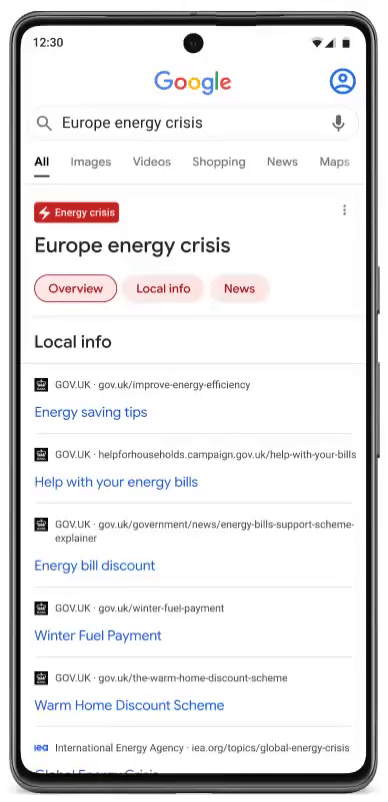Europe is gearing up for a challenging winter – with rising prices and pressures on the European grid, driven by Russia’s illegal war in Ukraine, further driving the need for secure, reliable, sustainable and affordable energy sources.
We know that energy security and affordability are top of mind for many across Europe right now. People are turning to Google to ask questions about conserving energy and managing their costs. In the UK, a year ago just one in ten searches on the topic of energy prices was a ‘why’, ‘how’ or ‘when’ question – now it’s one in four. In Germany, we’ve seen search interest trending for queries like ‘how to save natural gas’, ‘heating cost’ and how to save energy – while in Belgium, searches for ‘how to save on gas’ are up more than 5,000% since this time last year.
In times of uncertainty, people turn to Google for help and information. As people look for new ways to stay on top of their energy consumption and keep costs manageable, we’re launching a new feature in 29 countries and 22 languages across Europe to enable people to find relevant and actionable information to help them navigate this crisis and save energy.
Starting today, when people search for information on the energy landscape in Europe, they’ll see dedicated features with helpful and reliable information. When you search for things like ‘Europe energy crisis’ and ‘energy price’, you’ll see news articles, local information including financial assistance that may be available, and recommended actions from the International Energy Agency to help conserve energy.
Whether it’s turning down the heat or adjusting the settings of your boiler, you will be able to see, at a glance, information about saving energy in your home. These information panels will surface alongside other relevant results from the open web.
The launch of the energy crisis feature is a further addition to products and tools we have already launched in Europe to help people learn more about accessing energy affordably, reliably, and efficiently. For example, earlier this year we launched updates to Google Maps that help you find more fuel-efficient routes to reduce emissions and costs when you need to drive.
Technology can contribute to addressing the challenges facing Europe today. We remain committed to connecting people with timely, relevant, and actionable information when they need it most.


